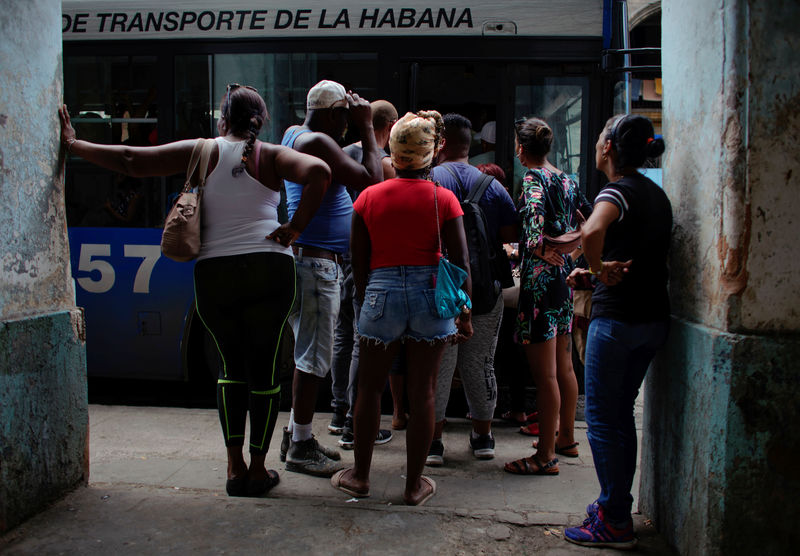By Sarah Marsh and Marianna Parraga
HAVANA/MEXICO CITY (Reuters) - A flotilla of shipments from Venezuela gave Cuba some respite this week from crippling fuel shortages in the wake of tougher U.S. sanctions, while Russia's prime minister pledged during a visit to the island on Friday to help develop its energy sector.
But support from two of its closest allies looks unlikely to resolve Cuba's energy problems and the government has extended many of the energy-saving measures it had introduced over the past month.
Havana warned on Sept. 11 it had not secured sufficient shipments of refined fuels, such as gasoline and diesel, for the rest of the month due to sanctions imposed by the administration of U.S. President Donald Trump in retaliation for its support for Venezuelan President Nicolas Maduro.
In response to the shortages, Cuba swiftly deepened austerity measures it had introduced since an economic meltdown in Venezuela, its principal supplier, choked off its energy imports.
Cuban authorities cut public transport last month, decreased production at some factories, and encouraged the use of more animal-powered vehicles and wood-fired ovens.
Venezuela responded by increasing oil shipments to its Caribbean ally, despite its own output issues and sanctions-related restrictions.
Since late September, at least eight tankers carrying some 3.83 million barrels of crude and fuel have been shipped from Venezuela, according to Refinitiv Eikon data and internal data from Venezuela's state-run oil firm PDVSA. That represents a sharp increase from five vessels loaded with 1.98 million barrels during the first half of September.
Following the shipments, there are no longer multi-hour queues at Cuban gas stations for gasoline, although diesel remains elusive.
Transport officials on Wednesday said they would be upping the frequency of train and bus departures, although not yet restoring "normality" following the drastic cuts last month.
President Miguel Diaz-Canel celebrated that Cuba managed to avoid blackouts in September in an editorial in the Communist Party newspaper Granma entitled "No fear of the current juncture."
The two-day official visit of Russian Prime Minister Dmitry Medvedev, which concluded on Friday, also sent a signal the island is not alone.
Medvedev on Friday visited a horizontal oil well located in the Boca de Jaruco oil field in northern Cuba which is being developed by Russian and Cuban state-run companies Zarubezhneft and Cubapetroleo.
Zarubezhneft plans to drill 30 wells in two years there at a cost of 100 million euros, Russian state-owned news agency Sputnik wrote on Friday.
The two countries are working towards reducing Cuba's dependence on energy imports by improving its energy efficiency and collaborating on oil exploration, a senior Russian government official told TASS news agency.
However, Medvedev did not announce any short-term measures to provide relief to the island during his visit.
MORE SHORTAGES LIKELY
Cuba's oil production currently meets an estimated 40 percent of its needs. Nearly all the rest has been supplied by Venezuela for years under a barter agreement for Cuban medical services, with some imports from other allies like Algeria and Russia.
However, analysts say Venezuela and Cuba will struggle to keep beating ever-tightening U.S. sanctions.
To supply Cuba in recent days, PDVSA used a portion of an old fleet that had not left Venezuelan waters for years, likely due to difficulty leasing tankers from vessel operators.
"It's getting tougher and tougher," said Francisco Monaldi, a Latin American energy expert at Rice University's Baker Institute. He said many companies in the industry were steering clear of any business with Venezuela in the wake of the sanctions.
Some analysts say one objective of Medvedev's visit was likely to discuss helping Cuba out of its energy crisis, perhaps in conjunction with Venezuela.
There has been a flurry of visits between high-level Russian, Venezuelan and Cuban officials of late. Most recently, Venezuela's Executive Vice President Delcy Rodriguez was in Moscow and then Havana.
"But the degree to which Russia can provide that is questionable given their own economic situation," said Jason Marczak, Director at the Adrienne Arsht Latin America Center.
TASS said Russian supplies of oil products to Cuba grew almost four-fold in the first half, citing the Russian government. It did not provide details, nor did it give shipment volumes for the second half, during which the Trump administration has upped the pressure.
Cubans, meanwhile, are struggling.
Niuris Higueras, owner of Havana restaurant Atelier, said authorities met a group of private business owners to ask them to slash their electricity usage by as much as half.
"I've mostly stopped using air conditioning and the electric oven," she said.
State offices are turning off electricity for several hours at midday. With the computers off, employees turn to paperwork or leave the office to escape the Caribbean heat.
Some state workers who were told to stay home without a cut in salary have not yet been recalled, while some Havana cinemas have only one screening a day instead of two or three.
"They ended the comedy shows at night due to the oil problems," said Yolanda Santana, a cleaner at the modernist Yara cinema. "I've no clue when the situation could improve."
